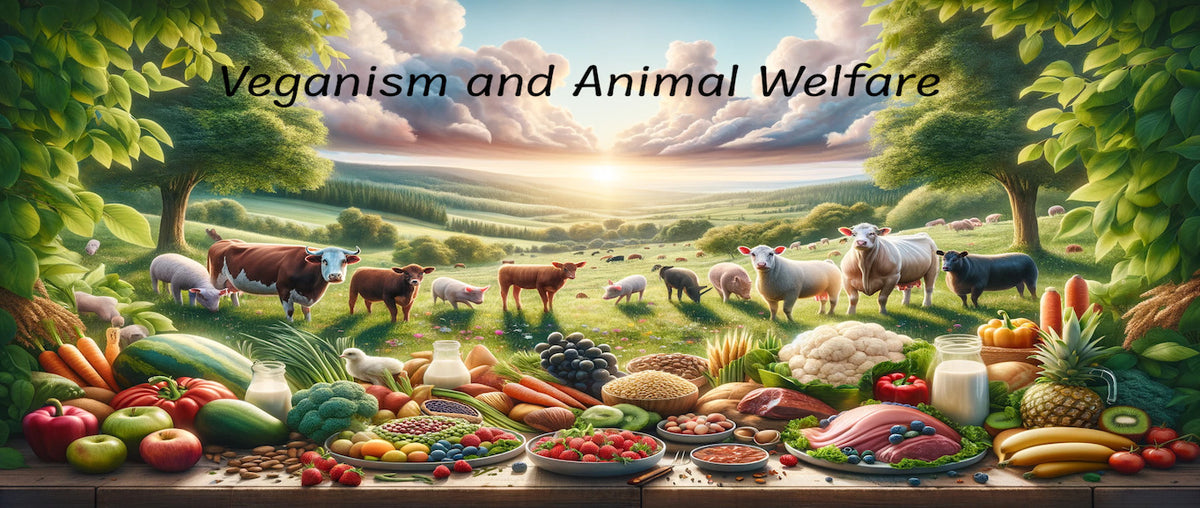Veganism and Animal Welfare: Transform Your Impact Today!
Adopting a vegan diet offers a comprehensive approach to better health, ethical practices, and environmental sustainability. This lifestyle choice excludes all animal products, emphasizing plant-based foods such as fruits, vegetables, legumes, grains, nuts, and seeds. By focusing on these nutrient-rich sources, vegans often experience significant health benefits, including improved heart health, reduced risk of chronic diseases like cancer and diabetes, and better weight management. Moreover, beyond the personal health advantages, Veganism supports a larger ethical and environmental ethos by reducing the carbon footprint and promoting animal welfare, making it a holistic choice for those looking to make a positive impact on both their health and the planet.
Benefits of Avoiding Meat
Health Advantages
- Eliminating meat reduces the intake of saturated fats and cholesterol, promoting heart health.
- Diets without meat have been linked to lower risks of certain cancers, primarily due to reduced consumption of processed and red meats.
Ethical and Environmental Impact
Choosing vegan food products and plant based foods over meat also aligns with ethical and environmental sustainability.
Health Benefits of a Vegan Diet
Adopting a vegan diet offers a multitude of health benefits. Here's a detailed look at some key advantages:
Rich in Essential Nutrients
Switching to plant based foods and eliminating animal products naturally leads to an increased intake of essential nutrients. A diet rich in vegetables, fruits, legumes, and whole grains provides ample vitamins, minerals, antioxidants, and fiber.
- Vitamins and Minerals: Vegetables and fruits are high in vitamins C and E, potassium, and folate, essential for overall health.
- Antioxidants: plant based diets are rich in antioxidants, which protect against cellular damage and reduce the risk of chronic diseases.
- Fiber: High fiber content in vegan diet aids in digestion and helps maintain a healthy gut microbiome.
Lower Risk of Chronic Diseases
Studies have shown that a vegan diet can significantly reduce the risk of developing chronic diseases.
- Heart Health: A vegan diet, particularly one rich in cholesterol free foods and high in fruits, vegetables, and whole grains, can reduce the risk of heart disease.
- Cancer Prevention: plant based diets are associated with a lower risk of certain types of cancer, attributed to high levels of fruits, vegetables, and fiber.
- Diabetes Management: A vegan diet can improve blood sugar control and may reduce the risk of developing type 2 diabetes.
Weight Management
Vegans typically have a lower body mass index (BMI) compared to non-vegans. The natural tendency towards fat free butter, plant based products, and fiber-rich foods helps in maintaining a healthier weight.
What is a Vegan Diet?
A vegan diet is characterized by the exclusion of all animal products and by-products. This includes meat, dairy, eggs, and honey. Embracing plant based foods, it emphasizes fruits, vegetables, legumes, grains, nuts, and seeds. The diet is not only a dietary choice but often a lifestyle decision influenced by health, environmental, and ethical considerations.
A Vegan Diet and Heart Disease
A vegan diet plays a significant role in heart health. It's naturally low in saturated fats and cholesterol, which are common in animal products. By incorporating Vegan Cheese, plant based cheese, and other vegan food products, you reduce the intake of harmful cholesterol and saturated fats.
- cholesterol free: Vegan products like cashew butter and vegan mayo are free from cholesterol, benefiting heart health.
- Reduced Blood Pressure: The high potassium content in fruits and vegetables can lead to lower blood pressure levels, reducing the risk of heart disease.

Types of Vegan Diets
Veganism can be tailored to individual preferences and nutritional needs, leading to various types of vegan diets:
- Whole-Food Vegan Diet: Focuses on a wide variety of whole plant foods such as fruits, vegetables, whole grains, nuts, and seeds.
- Raw-Food Vegan Diet: Comprises raw fruits, vegetables, nuts, seeds, or plant foods cooked at temperatures below 48°C (118°F).
- 80/10/10: Limits fat-rich plants like nuts and avocados, relying heavily on raw fruits and soft greens. Also known as the low-fat, raw-food vegan diet.
- Starch Solution: A low-fat, high-carb vegan diet focusing on cooked starches like potatoes, rice, and corn instead of fruit.
- Junk-Food Vegan Diet: Includes highly processed vegan foods like fries, vegan meats, and desserts. While devoid of animal products, it's less focused on whole, plant based nutrition.
The Impact on Arthritis and Inflammation
Alleviating Arthritis Pain
- plant based foods are known for their anti-inflammatory properties.
- Consuming plant based products like vegan cheese and vegan butter instead of animal-derived products can significantly reduce inflammation and arthritis pain.
- A vegan diet rich in antioxidants and phytochemicals from fruits and vegetables can alleviate joint pain and improve joint function.
General Inflammation Reduction
- Vegan diets are linked to lower levels of C-reactive protein, an indicator of inflammation in the body.
- Vegan mayo and cashew butter, which are staples in a vegan pantry, contribute to an overall anti-inflammatory diet.
A Vegan Diet and Weight Management
Natural Weight Management
- Vegan diets, which emphasize whole grains, legumes, fruits, and vegetables, are often lower in calories than diets that include meat and dairy.
- Foods like fat free butter and vegan food products can help in maintaining a calorie deficit, aiding in weight loss or weight management.
Long-term Health Benefits
- Maintaining a healthy weight reduces the risk of numerous health issues, including heart disease, type 2 diabetes, and certain types of cancer.
- Choosing cholesterol free foods and plant based products contributes to a healthier lifestyle and weight management.
Mental Health and Mood Enhancement
Boosting Mental Well-being
- Studies suggest a correlation between a vegan diet and improved mental health.
- Nutrient-rich plant based foods can enhance mood and cognitive function.
- Vegan products like Cashew Butter and vegan cheese, which are high in essential fatty acids, contribute to brain health.
Reduced Anxiety and Stress
- The ethical assurance of consuming cholesterol free foods and avoiding animal harm can lead to a sense of mental peace and reduced anxiety.
- Vegan Shop options often include mood-boosting foods like dark chocolate and fermented products, which are beneficial for mental health.
What Is Intermittent Fasting?
Understanding Intermittent Fasting
- Intermittent fasting involves cycling between periods of eating and fasting. It's not about what you eat but when you eat.
- Combining intermittent fasting with a vegan diet can enhance health benefits, such as improved metabolic rate and better blood sugar control.
Vegan Diet and Fasting
- A vegan diet, rich in nutrients and low in calories, complements intermittent fasting.
- Foods like vegan mayo, plant based cheese, and vegan butter can be part of a balanced eating window in intermittent fasting.
What Beginners Should Know About plant based Eating
Starting a Vegan Diet
- Begin by integrating more plant based products like vegan cheese and vegan butter into your diet.
- Understand the importance of nutrient balance, especially regarding protein, vitamins, and minerals.
Tips for Sustainable Transition
- Start gradually, replacing meat with plant based cheese, legumes, or tofu.
- Explore vegan shop options for diverse and exciting food choices.
Benefits of plant based Diets
Comprehensive Health Benefits
- plant based diets are associated with numerous health benefits, including improved heart health, better weight management, and a lower risk of chronic diseases.
- cholesterol free foods and fat free butter are examples of healthful alternatives in a plant based diet.

Environmental Benefits
Opting for a plant based diet significantly reduces one's carbon footprint and environmental impact.
Environmental and Ethical Considerations
Environmental Impact
- A vegan diet significantly reduces one's carbon footprint. plant based products require less water and land, and produce fewer greenhouse gases compared to animal farming.
- Vegan products like vegan cheese and vegan mayo contribute to a more sustainable food system.
Ethical Benefits
- Adopting a vegan diet aligns with ethical principles of animal welfare and compassion.
- Vegan shop options provide cruelty-free alternatives, enhancing consumer choice for ethical consumption.
Challenges and Considerations
Nutritional Deficiencies
- A well-planned vegan diet can meet all nutritional needs, but attention should be paid to nutrients commonly found in animal products, like Vitamin B12, Iron, and Omega-3 fatty acids.
- Supplements and fortified vegan food products can help bridge these gaps.
Balancing a Vegan Diet
- It's important to consume a variety of plant based foods to ensure a balanced intake of essential nutrients.
- Incorporating a range of plant based cheese, legumes, whole grains, nuts, and seeds is key to a nutritious vegan diet.
Transitioning to a Vegan Diet
Gradual Transition
- Start by incorporating more plant based products into your diet, gradually reducing animal-based foods.
- Explore vegan shop options for diverse products like cashew butter, vegan butter, and vegan cheese.
Support and Resources
- Utilize online resources and communities for recipes, tips, and support during your transition.
Vegan Recipes and Lifestyle
Creative Cooking with Vegan Ingredients
- Experiment with vegan products in cooking to discover delicious and nutritious meals.
- Vegan cheese and vegan mayo can be versatile ingredients in a variety of dishes.
Lifestyle Benefits
- A vegan lifestyle can be enriching and rewarding, offering health, ethical, and environmental benefits.
Conclusion
- The benefits of a vegan diet are vast, from improved health and weight management to ethical and environmental impacts.
- Embracing a diet rich in plant based foods and vegan products like fat free butter and cholesterol free foods can lead to a healthier, more sustainable lifestyle.
If you are a vegan, looking to dine something vegan in your city, check out our list of vegan restaurants in India.










